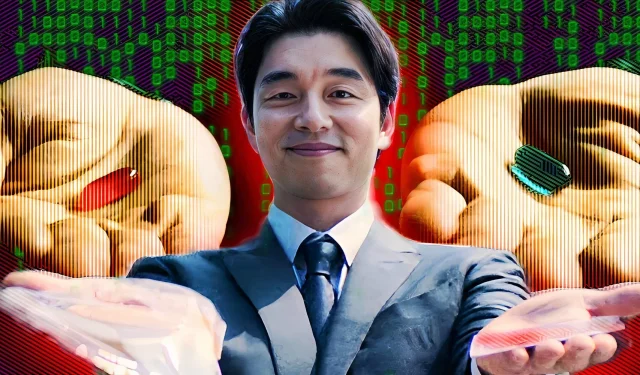
Warning! This article contains spoilers for Squid Game season 2.
Exploring Squid Game Season 2: A Deep Dive Into Its Matrix References
The second season of Squid Game captivates audiences with its intricate themes and harrowing twists, much like its predecessor. This season subtly weaves in elements reminiscent of The Matrix, thus enriching the narrative while foreshadowing significant plot developments for the upcoming season 3. While retaining the brutal allure of the original games, including the unforgettable “Red Light, Green Light,”season 2 ventures into new territories, introducing fresh games and a diverse cast. These additions provide a unique identity to the series, even as they echo its earlier themes.
Understanding The Front Man’s Matrix Analogy: The Meaning Behind The Blue & Red Pills
A Critical Choice Presented by The Front Man
In a striking parallel to Neo’s journey in The Matrix, Gi-hun searches diligently for the elusive Front Man, mirroring Neo’s quest for Morpheus. Upon finding him, Gi-hun faces a pivotal decision akin to choosing between the blue and red pills. The Front Man explicitly presents Gi-hun with these options: the blue pill promises a comfortable existence fueled by the wealth he secured in the previous games, while the red pill represents a return to the brutal realities of the competition with the intent to dismantle it.
Acclaimed creator Hwang Dong-hyuk parallels Gi-hun’s “unfinished journey” with that of Neo, noting that Gi-hun, like Neo, opts for the path fraught with challenges. “He could have just lived happily on, but he chooses to take the pill where he becomes aware of the Matrix and struggles to get away from it,” Hwang explains. This choice, rooted in courage and sacrifice, compels Gi-hun into a new realm of danger.
Gi-hun’s Resolve: A Desire to End the Games
The Complexity of Choice: A Study of Free Will
Throughout the series, Gi-hun confronts choices that resemble the red pill/blue pill dilemma, often opting to re-enter the competition rather than seek a peaceful existence far removed from its brutality. This decision indicates that his so-called autonomy is not purely his own; it is influenced by dire circumstances and the specter of despair.
In Squid Game season 2, a new game introduces a simplified version of this concept—one player faces a decision that embodies the red pill/blue pill paradox, where immediate needs clash with uncertain futures. Even as Gi-hun believes he’s wielding the power of choice, there exists an underlying sense of inevitability in his actions, highlighting a broader commentary on agency in desperate situations.
The quote from The Matrix Reloaded, “Choice is an illusion created between those with power and those without,” poignantly reflects Gi-hun’s struggles. His return to the games illustrates how systemic pressures significantly limit concepts of free will and personal agency.
The Front Man’s Choice: Comfort Over Truth
Drawing Parallels: The Front Man as Cypher
While the Front Man extends the metaphorical choice of pills to Gi-hun, his character resonates more closely with Cypher from The Matrix. As a pivotal figure in the game’s structure, he comprehends the intricate manipulations at play and chooses to embrace comfort and power rather than confront the reality of the games he oversees. Like Cypher, who betrays his allies seeking solace in ignorance, the Front Man also succumbs to the seductive nature of his authority.
Parallel Journeys: Gi-hun’s Fate and The Potential Downfall of The Front Man
A Prophetic Narrative: What Lies Ahead for Gi-hun
In a moment reminiscent of the Oracle’s wisdom in The Matrix, Gi-hun encounters a significant character, Player 044, who suggests that his survival carries purpose. This foreshadows a deeper connection to the pregnant player, Kim Jun-hee, weaving a narrative that hints at Gi-hun’s ultimate role in the unfolding chaos.
| Squid Game Key Facts Breakdown | |
| Written & Directed By | Hwang Dong-hyuk |
| No. Of Episodes | 16 |
| No. Of Seasons | 2 |
| Budget | US $21.4 million in season 1 and ₩100 billion in season 2 |
| Streaming On | Netflix |
Despite taking the metaphorical red pill, Gi-hun’s choices seem driven by a thirst for revenge rather than genuine transformation. As he navigates the precarious ending of season 2, his focus on vengeance places others at risk, sidelining the collective implications of his actions.
Ultimately, if Gi-hun grasps the significance of his so-called choice and sacrifices himself to save another, he could potentially dismantle the oppressive system underpinning the games. This selflessness would mark a thematic victory over the Front Man’s cynical worldview, illustrating that empathy and altruism can overpower greed and manipulation.
Much like Neo’s realization in The Matrix, Gi-hun’s journey will culminate in transcending his selfish motivations. Should he embrace the Shaman’s prophecy, it could herald a significant turning point that challenges the resounding despair represented by the Front Man’s character.




Leave a Reply